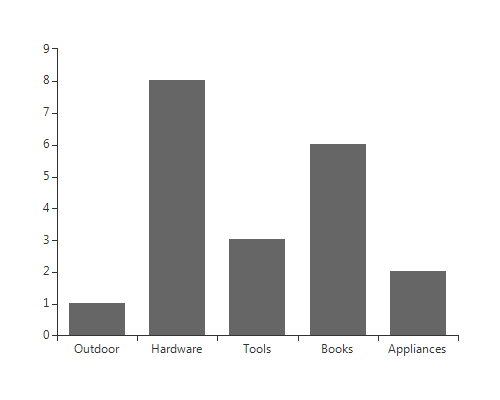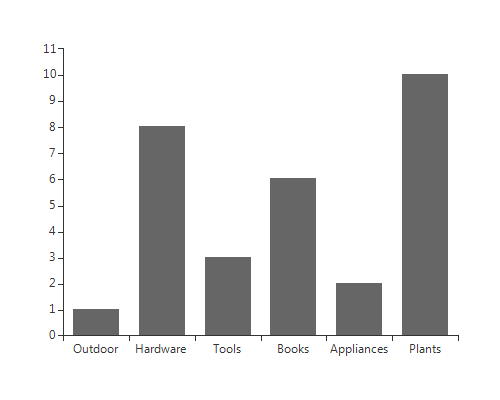Binding to BindingList
BindingList is a generic list type, that provides additional control over list items, i.e. the items in RadChartView can be easily edited, removed or added. BindingList also surfaces events that notify when the list has been changed. The example below creates a list of MyCustomObject, initializes the list and assigns it to the BarSeries object in RadChartView.
BindingList<MyCustomObject> myList;
protected override void OnLoad(EventArgs e)
{
base.OnLoad(e);
myList = new BindingList<MyCustomObject>();
myList = new BindingList<MyCustomObject>();
myList.Add(new MyCustomObject(1, "Outdoor"));
myList.Add(new MyCustomObject(8, "Hardware"));
myList.Add(new MyCustomObject(3, "Tools"));
myList.Add(new MyCustomObject(6, "Books"));
myList.Add(new MyCustomObject(2, "Appliances"));
BarSeries barSeria = new BarSeries();
radChartView1.Series.Add(barSeria);
barSeria.DataSource = myList;
barSeria.ValueMember = "MyInt";
barSeria.CategoryMember = "MyString";
}
Private myList As BindingList(Of MyCustomObject)
Public Sub New()
InitializeComponent()
myList = New BindingList(Of MyCustomObject)()
myList = New BindingList(Of MyCustomObject)()
myList.Add(New MyCustomObject(1, "Outdoor"))
myList.Add(New MyCustomObject(8, "Hardware"))
myList.Add(New MyCustomObject(3, "Tools"))
myList.Add(New MyCustomObject(6, "Books"))
myList.Add(New MyCustomObject(2, "Appliances"))
Dim barSeria As New BarSeries()
RadChartView1.Series.Add(barSeria)
barSeria.DataSource = myList
barSeria.ValueMember = "MyInt"
barSeria.CategoryMember = "MyString"
End Sub
Figure 1: Binding to BindingList

In order to allow RadChartView to automatically reflect changes in the data source, your object should implement the INotifyPropertyChanged interface:
Binding to BindingList
public class MyCustomObject : INotifyPropertyChanged
{
private int _myInt;
private string _myString;
public MyCustomObject(int myInt, string myString)
{
_myInt = myInt;
_myString = myString;
}
public int MyInt
{
get { return _myInt; }
set
{
_myInt = value;
OnPropertyChanged("MyInt");
}
}
public string MyString
{
get { return _myString; }
set
{
_myString = value;
OnPropertyChanged("MyString");
}
}
public event PropertyChangedEventHandler PropertyChanged;
protected virtual void OnPropertyChanged(string propertyName)
{
if (PropertyChanged != null)
{
PropertyChanged(this, new PropertyChangedEventArgs(propertyName));
}
}
}
Public Class MyCustomObject
Implements INotifyPropertyChanged
Private _myInt As Integer
Private _myString As String
Public Sub New(myInt As Integer, myString As String)
_myInt = myInt
_myString = myString
End Sub
Public Property MyInt() As Integer
Get
Return _myInt
End Get
Set(value As Integer)
_myInt = value
OnPropertyChanged("MyInt")
End Set
End Property
Public Property MyString() As String
Get
Return _myString
End Get
Set(value As String)
_myString = value
OnPropertyChanged("MyString")
End Set
End Property
Public Event PropertyChanged As PropertyChangedEventHandler Implements INotifyPropertyChanged.PropertyChanged
Protected Overridable Sub OnPropertyChanged(propertyName As String)
RaiseEvent PropertyChanged(Me, New PropertyChangedEventArgs(propertyName))
End Sub
End Class
Once the interface is implemented and your collection implement IBindingList, just like the BindingList does, changes are automatically reflected. Here is a sample of adding a new record:
Add Item
private void radButton1_Click(object sender, EventArgs e)
{
myList.Add(new MyCustomObject(10, "Plants"));
}
Private Sub RadButton1_Click(sender As System.Object, e As System.EventArgs) Handles RadButton1.Click
myList.Add(New MyCustomObject(10, "Plants"))
End Sub
Figure 2: Reflect Object Changes
